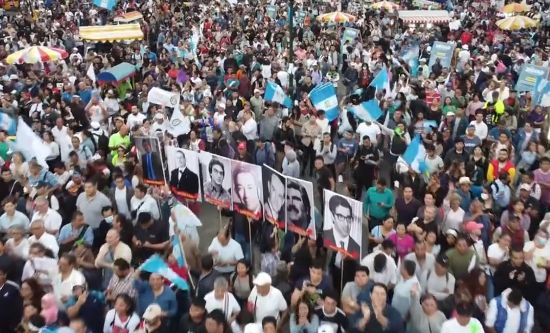
On 28 August Bernardo Arevalo won the presidential election of Guatemala with nearly 61% of the votes, becoming Guatemala’s first centre-left president in 68 years. He is set to replace Alejandro Giammattei of the conservative right-wing Vamos Party. However, in Congress Vamos still obtained 39 seats compared to Arevalo’s recently formed ‘Seed Movement’s’ 23, and the populist right-wing National Unity of Hope’s 28, leaving Aravalo with huge challenges in his legislative programme. Arevalo was subject to a smear campaign directed by the ruling class to try to block him from winning the election and which continues, to try to prevent him from taking office on 14 January, following his second-round presidential election landslide. At the mayoral level the Seed Party has virtually no representation, with the conservative parties completely dominant. US and European observers are thus entirely happy with the result.
The recently formed Seed Movement is a left leaning party formed around an agenda of anti-corruption. This was the basis of Arevalo’s presidential campaign, which threatens the local bourgeoise who syphon off meagre gains from imperialist exploitation of the country. Arevalo has faced increasing attacks from Guatemala’s judicial system and legal institutions, which is explicitly used by the ruling class to remove political critics such as journalists, progressive lawyers or judges who defend them.
After Arevalo became a frontrunner on 25 June, Guatemala’s attorney general, Maria Consuelo Porras, opened an investigation into the party on claims of fraud, ordering a police raid on their headquarters and the offices of the Supreme Electoral Tribunal. Rafael Curruchiche, head of the Office of the Special Prosecutor Against Impunity, then suspended the party on these grounds. The next day Guatemala’s Constitutional Court later granted an injunction against the suspension which allowed Arevalo to continue in the presidential race.
The right-wing National Unity of Hope (UNE) headed by Sandra Torres was the main opposition party in this election. It paused its own campaign in response to the suspension of the Seed Movement, refusing to participate unless there were ‘equal conditions’. However, since her defeat in the presidential second round (39% vote), preposterously Torres has changed her tune and has not conceded defeat, filing an official complaint alleging inconsistencies in the vote tally.
In response, Arevalo called for support from the voters on the streets – encouraging mass demonstrations and marches, with indigenous and peasant-led organisations such as CODECA announcing they would block the highways if the election results are not upheld.
US interference
The US has a long history of repression and exploitation in Guatemala. Guatemala was historically one of the ‘banana republics’ – entire nations subjugated under the control of US fruit company monopolies, entirely dependent on cash crops of bananas supplied to richer nations. In the 1930s, the United Fruit Company (UFC) was the largest landowner in Guatemala. It paid no taxes or import duties and owned all the telephone, telegraph, and railroad services as well as the seaports for trade. The intensity of exploitation by the UFC only increased until the Guatemalan Revolution of 1944 led to the country’s first free election in 1945 – of President Juan Jose Arevalo, the current President-elect Bernardo Arevalo’s father.
He enacted a transition to liberal democracy, implementing social reform policies such as a minimum wage and literary programs. His successor, Jacobo Arbenz, took over presidency in 1951. Arbenz officially recognised the Marxist Guatemalan Workers Party and attempted to perform limited land reform, redistributing 15% of UFC land to small capitalist enterprises at a time when 2% of the population controlled 74% of arable land. The United Fruit Company and rabidly anti-communist US did not stand for even this minor challenge to their monopoly dominance.
By 1954, Arbenz had been ousted by a CIA coup, and what followed was nearly four decades of horrific mass murder, torture, forced disappearances in the consequent civil war. A resistance movement made up of consolidated leftist organisations (the Unidad Revolucionaria Nacional Guatemalteca or URNG) and modelled after the Cuban Rebel Army fought in guerrilla warfare against successive vicious governments. During this 36-year civil war, 200,000 Guatemalans were killed, one million made homeless, 100,000 fled to Mexico and tens of thousands simply went missing. The Peace Accord of 1996 granted reprieve from constant war, but this was because the Guatemalan ruling class was finally pressed into agreement by intense international pressure and domestic business interests in the face of the URNG’s determined struggle Since then, there has been scandal after scandal of corruption and money laundering.
Today Guatemala is the largest country in Central America. More than half of its 17 million population living in poverty and half of all children suffering from malnutrition. The poverty rate is nearly 80% for indigenous people, who make up more than 40% of the country’s population.
At the same time, Guatemala’s economy is the largest in Central America: its GDP was $95bn in 2022 and the same year it had 4.1% economic growth. An astounding 19% of Guatemala’s GDP consists of remittances from over two million migrants forced out of the country by poverty. The largest trading partner is, of course, the US, accounting for nearly 35% of trade.
On Arevalo’s win in the elections, the US Secretary of State stated: ‘The United States remains concerned with continued actions by those who seek to undermine Guatemala’s democracy… We look forward to working with Guatemala’s next president to further strengthen the US-Guatemalan relationship.’
The Guatemalan people have been subject to over 100 years of violent suppression and enslavement by the US interrupted only briefly for a decade by the democratic elections of Juan Jose Arevalo, Arevalo’s father, and Arbenz. Today even limited reforms threaten US hegemony in the region. US imperialism is banking that Arevalo will be contained by the results of the elections. The interests of the working class of Guatemala can, in the first instance, only truly be promoted by the defeat of imperialist interests in Guatemala.
Annie O’Conner




